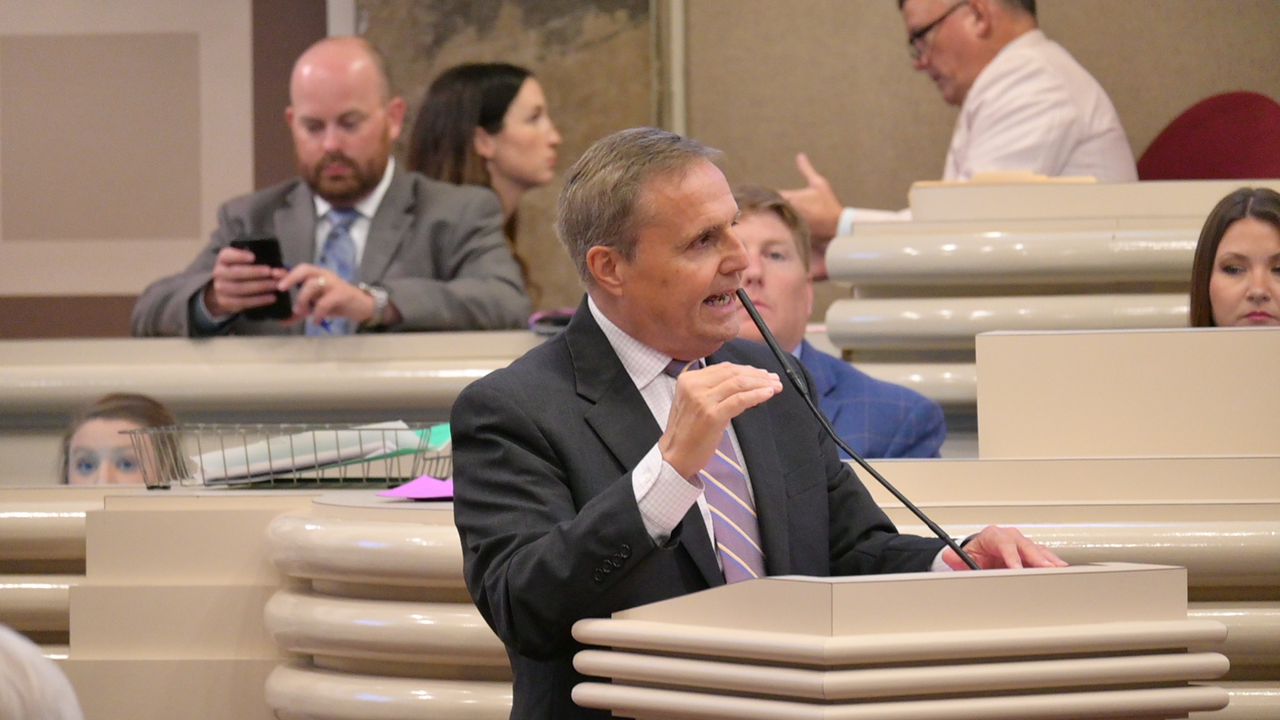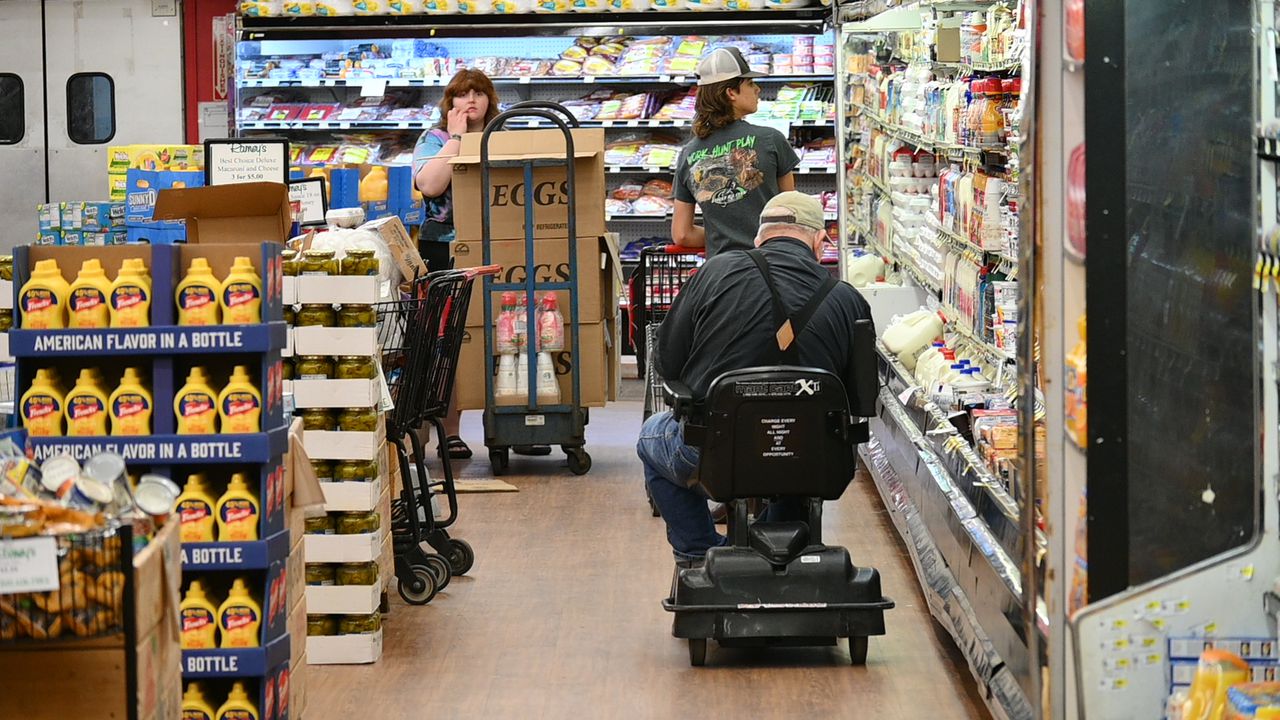Can Alabama eliminate its entire grocery tax?
Publix, Rouses, Walmart, Sam’s Club, and Target all sell groceries in Daphne. So, too, do the convenience stores abundant throughout the city. There are also meat and fish markets, Dollar General and Aldi’s.
If the city would cut back on the grocery tax, it would blast the city’s budget and immediately erase around 15% of the overall sales tax revenues that go toward financing Daphne’s basic city services.
Your questions answered on the sales tax cut for groceries: Alabama cuts grocery tax to 3%: When does cut start? How much will I save? What foods are included?
But after state lawmakers approved — for the first time in generations — a cutback in the sales tax on groceries, cities like Daphne and beyond could be studying if they can also offer relief at the grocery check-out aisle.
“I’m sure the city council will discuss it and talk about it but it’s a big hit to the revenue in the city of Daphne,” said Daphne Mayor Robin LeJeune, who estimates groceries bringing in around $3.8 million to $4 million of the $25.7 million in sales tax revenues to the general fund. “We do have quite a few places that make up our grocery tax.”
Related content:
It won’t be an easy request. City and county governments rely heavily on the sales tax to fund basic services like paying for police protection and patching potholes. And the local governments in Alabama are also hamstrung by the state’s constitution in preventing them from raising revenues from other sources that might be needed to offset a local sales tax cut on groceries. Alabama is one of six states with no home rule provisions, which means the state prohibits city and county governments from raising their own taxes.
“I suspect this would be a significant impact for us,” said Mobile City Councilman Joel Daves, who is chair of the council’s finance committee. “If you’re not getting (revenues) from the sales tax, where are (you) going to get it? The state has income tax, and they have other revenue sources. We’re in a different situation than the state.”
Study the cut
Alabama’s existing tax structure relies heavily on the sales tax to fund government. And it’s more pronounced on the local level. According to the Tax Foundation – a Washington, D.C.-based think tank that studies U.S. tax policy – Alabama has the highest average local sales tax rate in the country at 5.25%.
The sales tax on groceries is also a crucial funding source for small towns and cities that dominate Alabama’s landscape where few retailers are present aside from dollar stores and a grocery store.
“We have 464 municipalities, and each are unique in their revenues and how those revenues are derived,” said Greg Cochran, executive director with the Alabama League of Municipalities. “Some may be able to make cuts to their local sales taxes while others simply cannot afford to cut them.”
Aside from the state’s 4% sales tax, the overall grocery tax is determined by generally adding on city and county tax rates, which vary throughout the state. For the largest cities in Alabama, the grocery bill is based on the following:
- In Mobile and Montgomery, the sales tax rate on groceries is 10%. In Mobile, it’s broken down by 4% to the state, 5% to the city and 1% to Mobile County. In Montgomery, it’s 4% to the state, 3.5% to the city, 2.5% to Montgomery County.
- In Birmingham, the sales tax rate on groceries is 10% broken down by 4% to the state, 4% to the city, 1% to Jefferson County and additional 1% special district tax.
- In Huntsville, the sales tax rate is 9%, with 4% going to the state, 4.5% going to the city, 0.5% to Madison County.
But a grocery tax cut is something that lawmakers say the local officials ought to at least consider exploring after the Legislature approved its own cut. Alabama Gov. Kay Ivey still must sign the legislation authorizing the tax cut into law.
“I think you’ll hear more debate and discussions within cities and counties as more local folks raise this issue with local elected officials,” said State Senator Andrew Jones, R-Centre, and Senate sponsor of HB479 that cuts Alabama’s sales tax on foods by 1 percentage point on September 1, followed with the potential of cutting an additional 1 percentage point by 2024.
The remainder of the state’s overall 4 percent sales tax on food – which could be 2% by next fall – could also eventually come off. If the full 2% is removed, it could save a family of four around $300 a month in groceries, though Jones said it could be lower at around $200 to $250 a year. A joint study commission on grocery taxation, formed during the legislative session, will study if the entirety of the state’s tax can be removed. The commission’s first meeting is expected to occur in November.
“Folks will have to think on the local level on how to handle this,” Jones said.
State Rep. Patrice McClammy, D-Montgomery, who will also be part of the group, said she hopes the entire tax can be cut someday. “Hopefully one day we’ll see a full repeal across the state and there is no tax on groceries,” she said.
Taking a pass
For now, even some of Alabama’s richest cities are taking a pass on considering a cut of their own. They say the loss of cutting their sales taxes on groceries is too great and will disrupt the services residents have long expected.
“Our local sales tax (rate) is 3% while all of our surrounding cities are 4%,” said Sam Gaston, city manager of Mountain Brook – the Birmingham area suburb with the state’s highest annual median income. “We have five grocery stores in our city which account for a sizeable amount of our $13.7 million annual sales tax number.”
He added, “I would think we will not be reducing our 3% on groceries.”
In Orange Beach, the city’s administrator does not believe any city in Baldwin County – ranked No. 3 among 67 in median income – will approve a sales tax cut in groceries given the challenges that rapid growth in the area is posing to officials. Orange Beach, like neighboring Gulf Shores, has experienced a surge in lodging tax revenues in recent years due to the popularity of the state’s beaches as a travel destination. Orange Beach, for instance, adopted a lodging tax increase last year to help finance a new city school system.
“The state has taken this step due to a significant surplus in state revenues following the federal distribution of COVID funds,” said Grimes. “Local governments typically depend on all local taxes they have in place to provide the basic services such as police, fire, streets trash and recreation.”
Other cities in Alabama are not leaping at the prospects of removing a reliable revenue stream.
“We don’t have a way to replace the revenue and most everything we purchase in city government is much higher than our current budget numbers,” said Ozark Mayor Mark Blankenship.

Tuscaloosa Mayor Walt Maddox at a summit on Monday, June 28, 2021, at the Battle House Hotel in Mobile, Ala. Maddox was one of the mayors attending the summit that included the mayors or their representatives of the 10 largest cities in Alabama. (John Sharp/[email protected]).
Few cities are likely to study cutting their local sales tax cut. Tuscaloosa, however, plans to take a dive into the issue, according to Mayor Walt Maddox. He said in the coming weeks, the city attorney’s office and the CFO and budget team will provide an update analysis for consideration in the mayor’s fiscal year 2024 operating budget, which begins Oct. 1.
“As for other local governments in Alabama, it is doubtful that many will be able to take advantage,” said Maddox, adding that the state’s constitution and a lack of home rule authority is a major hurdle toward fully eradicating the state’s grocery tax.
Larger-scale talks
The cut, though, could underscore an eventual larger-scale discussion on Alabama’s tax structure. In the lead-up to HB479′s approval, lawmakers said that Alabama remained among the lowest taxed states in the nation on a per capita basis. Lawmakers referenced a report from Birmingham-based Public Affairs Research Council (PARCA).
According to the report, state and local taxes in Alabama were $3,756 per capita. Tennessee, at $3,719, was the only state lower, according to the report released in December.
But tax reformers and critics have long said Alabama’s tax system is regressive and affects lower income people the most because of the heavy reliance on sales tax. Alabama pays the lowest property taxes per capita, according to the PARCA report.

Alabama State Rep. Danny Garrett, R-Trussville, speaks out in support of legislation that allows for a 2 percentage point tax cut to the state’s 4 percent sales tax on groceries during a House floor debate on Thursday, June 1, 2023, at the State House in Montgomery, Ala. (John Sharp/[email protected]).
“We are a low tax state and we clearly have to make choices going forward with tax cut measures,” said state Rep. Danny Garrett, R-Trussville. “We have to look at how we tax people and what our tax polices are.”
Quin Hillyer, a Mobile-based columnist for the Washington Examiner, called the tax cut “a great move for Alabama,” and one that will “treat low-income people better and will encourage economic growth.”
Hillyer, though, said he believes cities and counties should pause a bit before moving forward with other cuts. Hillyer, in 2015, was a member of an ad hoc committee in Mobile that explored ways to offset the revenue losses from removing a penny sales tax at the time. Among his group’s findings was for the city to consider a property tax increase.
Mobile County’s property tax rate structure was among the lowest in the country, according to the group’s findings. Of 1,833 counties in the U.S. with populations over 20,000, 1,626 of them had a higher property tax as a percent of median home value.
“Let’s let this one settle before anybody else piggybacks on it,” Hillyer said about the state tax cut on groceries. “I think cities should let things shake out before figuring if they want to do the same.”

